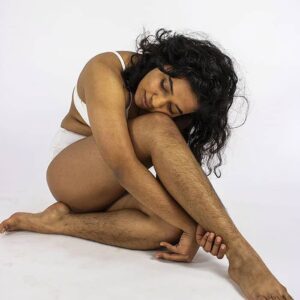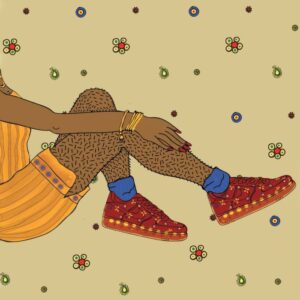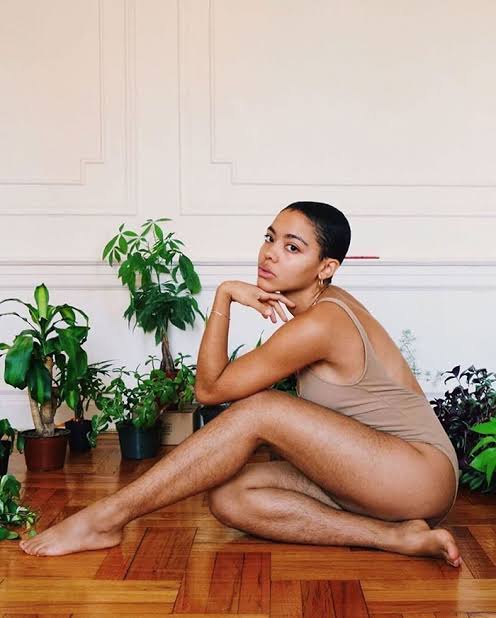I grew up watching womxn on hair removal adverts, running their manicured hands over their glistening, smooth, and hairless legs. Regardless of whether it was eyebrows, armpits, lashes, upper lips or arms; everything was fluffed to ‘perfection’. For me, this was the epitome of normalcy, femininity and sensuality. Unfortunately, my reality has never reflected that. The only conversation I had when I hit puberty was about cleanliness particularly during my period.
No one ever advised me about external grooming habits, because let’s face it, intimate body parts aren’t a point of discussion in African homes. I made the conscious decision to try out razor blades and cream in high school but things like waxing always seemed a little too extreme for me. I’m 25 and still feel like I’m fumbling my way through body hair management. I’ve dealt with itchy skin from razor bumps, cuts, ingrown hairs, the pungent smell of creams, darkened armpits and uneven body hair; only adding to my self-consciousness.

Source: DeMilked
I consider myself hairy and I’ve always felt defeminized for the body hair I couldn’t hide on my arms, knuckles and legs. I stopped shaving my legs by the end of high school because it was tedious, never looked right and I couldn’t keep up with how fast it grew back. I believe subconsciously this is why I only ever wear pants and you’ll never catch me slipping in a bikini.
I literally make social plans around my shaving schedule because the display of pit hair seems taboo, almost rude and déclassé. I only started shaving my pubic hair when I started dating out of ‘courtesy’. As I have gotten older I’ve realised that these expectations have been self-inflicted and influenced by a very westernized perspective on beauty. History will tell you about the origins of hair removal from a Grecian perspective and the only African based narrative has been Egyptian. And still, I don’t relate. I look back and realise that I may just be the odd one out because the womxn I grew up around were actually hairless.
Based on evolution, African womxn should have less body hair because our natural adaptability to a warmer climate means our bodies don’t need as much insulation. It’s taken the beauty industry too long to understand that African womxn were a specific target market that needed products specific to their genetic makeup. For example, because of pigmentation issues, black womxn couldn’t laser their body hair off until recently and that’s mostly what it comes down to with body hair; genetics and environmental conditions. You can’t alter genes, and for me, the turning point comes when I start thinking ‘If I love myself, then I will do better for myself and there’s absolutely no way I get to that point unless I confront myself with the reality that I don’t enjoy body hair removal so then why do it? I needed to get acquainted with my body hair from an African perspective. I’ve learned that historically men in Ethiopia were the only ones allowed to use blades to manscape whilst the womxn had to rub ashes between their fingers to painstakingly pluck out their pubic hair. I couldn’t help but think how yet again patriarchy had managed to seep into something it had no business being in. San women on the other hand were plucked by their husbands.
In West Africa, Igbo womxn are stereotyped as being hairy in literature like Igbo Village Affairs which connotes pubic hair as a point of pride, particularly in hetero-sexual relation dynamics. For example, the more pubic hair then the less sexual partners a womxn has had or the more a man will love her. A womxn who accepts her man’s wandering eye has more pubic hair and surprisingly womxn with less pubic hair were pitied. Whereas in Southern Africa, the Shona people considered luscious pubic hair on womxn as a sign of fertility whilst the Kwoma people of New Guinea revered body hair as a mark of beauty. Therefore, perhaps African womxn are more inclined to be more accepting of body hair because of cultural conditioning.

Source: Buzzfeed
It’s even more mind-boggling to realise that the shaving of hair on the head is associated with grief or rites of passage in most African cultures. If I had grown up with these narratives at the forefront of the content I was exposed to, I would probably have a very different approach to body acceptance. The reason I probably feel like the only African womxn who obsesses about body hair is that we don’t talk about it in our context. At some point body hair removal moved from an indulgent beauty choice to an imposed and necessary hygienic routine when in actual fact body hair acts as a buffer against harmful micro-organisms. Movements such as Januhairy and #everydaylookism are flipping the narrative. Body hair removal has nothing to do with financial class or status. It does not make you more virtuous or cleaner. It is almost ridiculous that something as personal as body hair has been turned into a political statement, but perhaps the protest is against consumerism and the pink tax on grooming products. In trying to simply embrace themselves womxn are marked as activists or fetishized.
Perhaps African womxn aren’t as pressed because we’ve been ostracized for so long that body hair is simply just one more thing to add to a never-ending list of black self-hate and body-policing propaganda particularly because we’ve been told that our version of ‘natural’ is unhygienic, unprofessional and abnormal. Perhaps it’s not that deep and it’s just because our body hair doesn’t really stand out against our darker skin tones. Whether you shave, pluck, wax, laser or let it grow out, we can’t deny the layered complexity of our relationship with body hair; the bottom line is CHOICE. Be a hairless wonder, embrace the fuzz or be an in-betweener. Personal preference is key.





